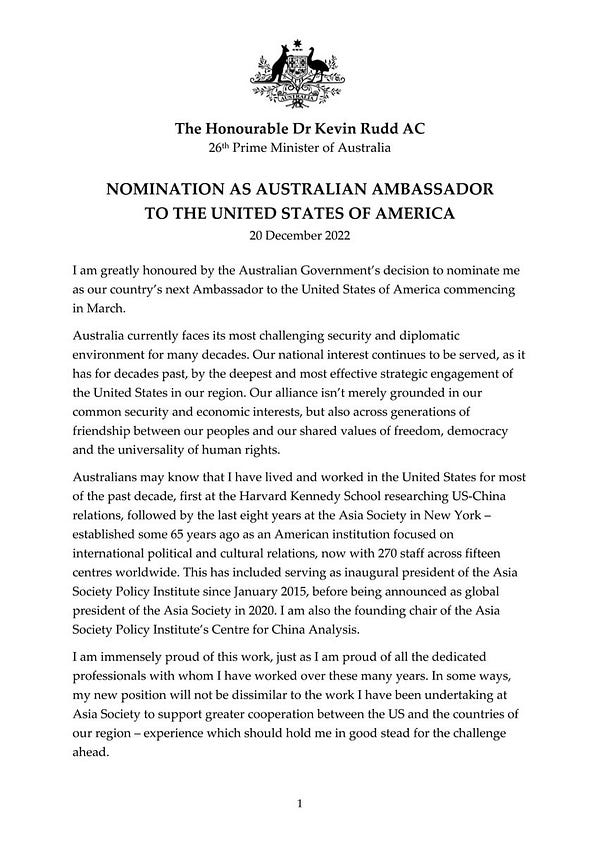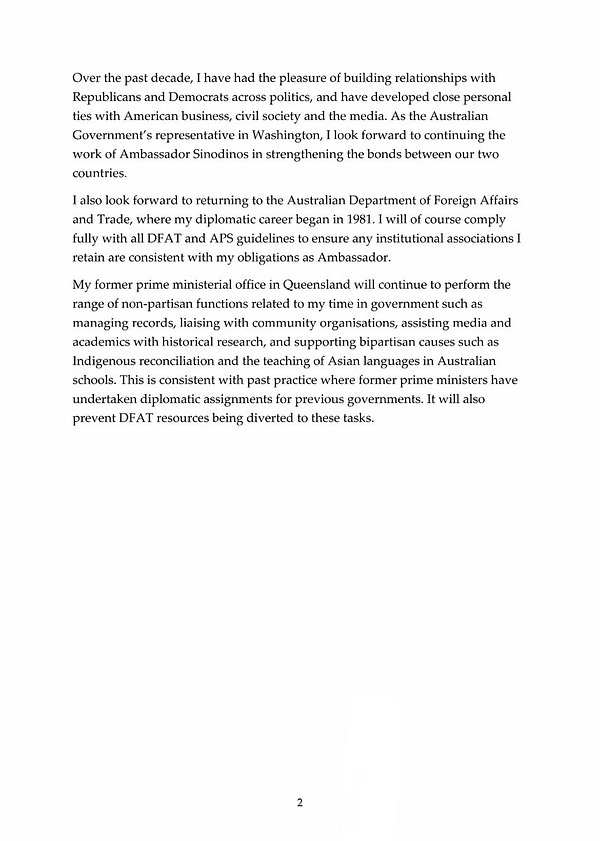Must Have Foreign Policy Books And Podcasts In 2023
Books and podcast that will inspire you with broader, practical, solution-oriented insights for the year ahead
I hope everyone has been having a relaxing holiday period and getting ready to welcome in 2023!
At the end of every year, I write up a list of the top books and podcasts that I found over the course of the year particularly inspiring, uplifting and motivating. You can read my 2020 and 2021 lists here and here.
I’ll be publishing different categories of my 2022 list over the course of the coming week. You can jump ahead and read the full list here, but I will be publishing extra details, links and additional suggestions on this newsletter additionally.
This first set of recommendations focus on foreign policy, ranging from Australian politics through to the state of US-China relations. As always, if you like what you read, please subscribe if you haven’t already done so and consider sharing to your networks.
Wishing everyone a happy 2023!
Mick
Never, by Ken Follett
I read some years ago Follett’s epic Fall of Giants, the first book in his Century Trilogy, that follows the lead up to, the causes, and the horrendous consequences of the First World War. In some ways, Never, is even more ambitious, if not a little uncanny given its proximity to the present. In the first few pages, Follett describes how he got the idea for the book when he was researching for Giants. He notes that none of Europe’s early 20th century leaders wanted to go to war and yet somehow they still found themselves caught in that most brutal and self-destructive of conflicts. Follett had asked himself if the same could happen today and Never is his attempt at providing an answer to that foreboding question.


Never is set between and follows compelling storylines in the Sahel region of North Africa, Washington DC and Beijing. At first the storylines feel quite disconnected from each other but soon enough local fault lines emerge with global implications, tensions rise, and a small event (or two!) in a corner of the world brings them all crashing together.
With everything that has happened this year, readers may find the relative absence of Russia throughout the storyline as a bit amiss. It was, after all, first published in 2021. Additionally, in this version of the present at least, Taiwan turns out to be less of a fault-line for war than other regional flashpoints. Yet in many ways, all of this serves to underscore the book’s main point (and the invoking at the start of the causes of WWI). As was the case just over a century ago, in a multipolar world, the room for strategic misunderstanding can arise suddenly and without much warning. Regional hotspots that might have appeared dormant can rapidly spiral out of control as a result of an unforeseen triggering event, which although occurs locally, quickly escalates and drags in the world’s major powers.
Any close watchers of current geopolitics, and students of history, are likely to know - only a fool would answer Follett’s question with the word “Never.” Ultimately, the book serves as a timely reminder of how wars begin, assumptions are made, and the unimaginable becomes reality.
The Avoidable War: The Dangers of a Catastrophic Conflict between the US and Xi Jinping's China
On the subject of US-China tensions, Kevin Rudd’s latest book is arguably second to none in its attempt to decipher the mind of China’s third term president, Xi Jingping. Avoidable War should be required reading for all policy makers today. Rudd’s focus is on the here and now with the objective of providing a foreign policy blueprint for avoiding war in the next decade between the US and China.
Rudd’s optimism is mixed with a healthy dose of realism in his prescription. Gone are the ‘end of history’ days when we could hope for China and the US to come together in a kumbaya partnership for the betterment of humanity unhindered by outdated 20th century notions of nationalism and hegemony. Those traits are, whether we like it or not, back in vogue and a contest for regional, and even global, pre-eminence is clearly under way. It is a fool’s errand to argue otherwise.
The way forward for the US and China, according to Rudd, is to establish clear guardrails - rules of the road - within which this contest should play out. The best we can arguably hope (and strive) for, short of military escalation, is each country competing for dominance in economic, technological and financial spheres. Rudd calls this “managed strategic competition.” If each country can stay in its own lane militarily, then “may the best system win” in the realms of competition.
In establishing clear rules to avoid conflict, we might also be able to hope for strategic cooperation in areas like climate change. One insight of Rudd’s is just how significant this decade of the 2020s actually is to the future of all of humanity with two potential existential crises playing out alongside one another. The 2020s may very well be the most consequential decade facing humanity since the 1930s. For it is in this decade that our actions will determine whether we avoid both catastrophic climate change, and unfathomable levels of conflict between the great powers.
We’ve heard time and again how the actions we take this decade will determine whether or not the world will avoid catastrophic climate change. This means reducing global emissions by at least half by 2030. With China and the US the two leading emitters there is no way this target can be achieved without a high degree of cooperation between them. Yet, such collaboration must be done at the same time tensions between them are at an all time high.
Now is the time for smart, rational, thoughtful, imaginative diplomacy and political leadership to guide us through the coming decade. And we need creative policy entrepreneurship in spades. To that point, I for one am glad Kevin is back in the world of diplomacy as Australia’s next Ambassador to the US.



Kevin has been a longtime supporter of our work at Global Citizen and me and my wife Xinyi was fortunate to have dinner with him earlier this year shortly after his book came out. Wishing you all the best in DC, Kevin!
No Enemies No Friends: Restoring Australia’s Global Relevance, by Allan Behm
Talking of Australia’s role, I greatly enjoyed reading Behm’s No Enemies, No Friends, after it was recommended to me by a friend in the Australian Senate. Those who know me know that I have always been passionate about Australia’s ability to harness creative middle power diplomacy and have a positive impact in nurturing global public goods, both for the world’s interests and for Australia’s.
The book also taps into my own grumpiness about the short-sighted and uninspiring nature of Australian foreign policy over the last two and a half decades, but particularly the last 10 years. Terms like “punching above our weight” illustrate the problem clearly. It implies a rather low assessment of Australia’s ranking in the world and that somehow we are already acting above our station when in fact the opposite is arguably more true. If anything, putting a few exceptions to one side, we punch below our weight.


The election of the Labor Albanese Government in Australia earlier this year has already seen a few positive strides from higher climate ambitions to a slight increase in the Australian aid program. Yet, this is the bare minimum and more must be done, ideally in a bipartisan way, to cite Behm, Australia is to restore its global relevance. Behm’s book is a great read on how this should be approached.
Principles for Dealing with the Changing World Order: Why Nations Succeed and Fail, by Ray Dalio
Like Rudd’s Avoidable War, Dalio’s latest principles are essential reading for those interested in US-China relations. Dalio’s analysis is based on a cyclical view of history focusing on the boom and bust, rise and fall of empires throughout history. He then constructs a series of principles focused specifically on Dutch, British and American experiences with hegemony. One of Dalio’s essential premises is that the loss by an empire of its currency as the world’s dominant reserve currency is a harbinger of the loss of hegemony more broadly, albeit generally several decades behind.
Overall, Dalio could be criticized in some quarters for giving the impression, at least implicitly through his at times fatalistic style of writing, that the outcome of the US-China rivalry is a foregone conclusion. Accordingly, it could be inferred from Dalio’s analysis, rather than try and reverse the inevitable, American policymakers should already be moving their focus towards how to best adjust to and make the most of a new world in which they are no longer the sole dominant power. Dalio uses the case study of the UK’s peaceful acquiesce to American hegemony in the 20th century as a case in point.
In Dalio’s defense, the aim of his book is not to make predictions about the future or prescribe policy solutions. He also does not rule out the possibility of unforeseen events occurring that disrupt current trends. History, as he points out, is littered with examples of countries that had all the makings to become the dominant hegemony but didn’t. For example, anyone writing in the late 18th century might have assumed France, not Britain, would dominate the 19th century were it not for a series of crises, shocks and revolutions. In the end, Dalio is merely making assessments based on large long term trends and data sets, much as any good investor would do. What to do with this information is a matter for others.
As well as this particular book, I also recommend subscribing to Dalio’s email list and notes. He regularly publishes ongoing commentary, applying his principles to real world events. Whether you agree with Dalio or not, he’ll certainly challenge your own assumptions about the world.





